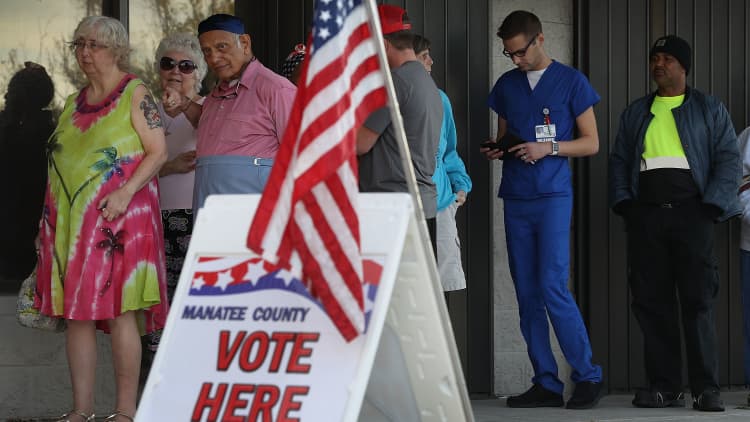
PORT ST. LUCIE, Fla. — At the Tradition community here, joggers share the sidewalks with skinny-legged cranes, young parents bring their toddlers to the town square to learn how to walk and the homes lining the pristine streets are selling for about half of what they did a decade ago.
A young mother, who wanted to be known just as Nicole, has decided to sit this presidential election out.
"There is just so much controversy on both sides of it. I don't know who I would vote for, to be honest," she said.
Nicole grew up in this Atlantic coast city and watched her parents suffer through the recession. Just more than 10 percent of homeowners in the city of roughly 170,000 lost their homes to foreclosure, according to Attom Data Solutions.
One in 5 today still owe more on their mortgages than their homes are worth, more than twice the so-called underwater rate of the rest of the nation. Voters who are going to the polls here have their pocketbooks top of mind.
"The Clintons seem to be interested in their own financial future, and Mr. Trump seems to be interested in the country's financial future," said a middle-aged woman named M.J., who was sitting on a bench by the water preparing for a job interview. She is currently unemployed.
By Monday, when early voting in Florida was over, about half the state's registered voters had already cast their ballots. Democrats turned out in larger numbers than Republicans, but not by very much. Most analysts agree that Donald Trump cannot win the nation without Florida, but the latest polls show the state is in a virtual dead heat.
One dynamic that may favor Hillary Clinton is the Hispanic vote. Florida's electorate is 17 percent Hispanic, a higher share than the rest of the nation, which stands at 12 percent, according to Pew Research. Early readings show Hispanic voters turned out in larger numbers than past elections. One million of the 6.4 million votes cast so far in Florida were by Hispanics, as counted by University of Florida professor Daniel Smith, who tracks voter turnout.
Juan Dyer voted early, and by Monday was helping his young son learn to walk on the grassy town square at Tradition.
"I just wanted to be done with it. There is a lot going on on both sides, and the country is divided. I wanted to be done," Dyer said.
Far more Hispanic voters turned out in person to vote this year, according to Smith, compared with 2012. This could be seen as a sign of increased enthusiasm among the cohort.
"Donald Trump hasn't been a favorite for Latin voters, and I think they just wanted to prove it, prove it in the numbers," Dyer opined.
Dyer has only lived in Port St. Lucie for five years, and did not see what happened to this community during the recession. He said the economy was secondary in his decision-making.
Nicole, on the other hand, seemed paralyzed in her decision, largely due to her experience growing up in Port St. Lucie.
"I listened a lot to what my parents said, and on one side, Hillary Clinton's been in the government for so many years now, and what really has she made that much of a difference on? What has she done?" asked Nicole. "On the other side, Trump has been in the business world for so many years, I mean, I just don't know."


